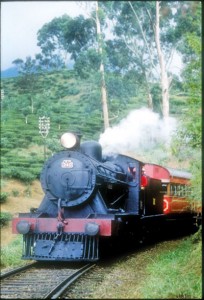Book review: “Small is beautiful”
(Author – Roshanga Wickremesinghe. How small countries can compete and grow: A case for Sri Lanka. Colombo: R & R Associates Consulting)
“Even though we are an island nation,” writes Roshanga Wickremesinghe, “Sri Lankans are not sailors by any stretch of the imagination.”
The deep-going truth contained in this statement lies at the core of what is wrong with this country. Our merchant navy is almost non-existent and our fishing fleet is Lilliputian. We talk about being this hub and that hub, but we do very little to promote our existing resources. What is our strategy to turn Sri Lanka into a logistical hub, for example? Where is our connectivity with Africa, vaunted as the “next China”? What are we doing to develop new routes? Why should shippers or airlines pick Sri Lankan destinations rather than Indian or South-East Asian ones?

File picture of a Sri Lankan train.
Roshanga Wickremesinghe’s eminently readable book devotes an entire chapter about Sri Lanka’s need to develop effective logistical strategies to exploit its geographic position, and how to do so. The author describes how its position at the centre of a huge maritime exclusive economic zone could enable Sri Lanka to be one of the world’s top three fresh fish exporters.
The theme of using our existing natural resources, developing them pro-actively, is a theme which runs through this slim but valuable volume.
Another is the need to modernise the economy and the way we think, but adapting that modernisation to our own culture and according to our own necessities. Blind copying of the strategies used elsewhere will not suffice. We have our own strengths and weaknesses, and we must reinforce our assets and enfeeble our liabilities. And we must plan in the long-term.
Short-termism has ruled the roost for far too long now. Its effects can be seen in the traffic congestion affecting Colombo and its approaches. Every now and then, we apply some kind of patch to keep the flow going, whereas we need deep-seated change in the way we go to work or transport our goods.
Why, when we have a railway that once ran all the way through the harbour right up to Chalmer’s Granary do we depend on an enormous fleet of lorries to transport our containers to the container yards? Why, when we have a railway that comes right into the centre of Colombo from four directions, do we depend on cars and taxis?
Wickremasinghe devotes considerable attention to the need to develop our infrastructure. But he does not limit it to “hard” infrastructure – roads, railways, pipelines and electricity lines. He devotes much attention to “soft” infrastructure, the way we do things, the software for our “hard” infrastructure.
Just consider how difficult it is to do anything in this country. The onus is on the public to do everything. You are expected to know whether a road is one-way, how to fill in a complicated form, the procedure for obtaining an electricity or water connection, or where the pesto is (if it is there) in the supermarket. Asking such questions is met by blank-faced or annoyed stares.
People do not know how to react to unexpected situations – or sometimes not so unexpected, simply unusual. The system collapses in the face of the unfamiliar. The supermarket employee has never heard of pesto and asks another equally bewildered employee. The taxi driver doesn’t know a shortcut from Nawala to Kalubowila Hospital. Our society and economy are made up of a collection of such “don’t knows”. When an investor confronts such a situation what will their reaction be?
Our antiquated education system forms part of the problem. Our students learn “by heart”. They internalise facts, which are to be forgotten as soon as the exam has been passed. Wickremesinghe describes it aptly as “Victorian redundant 3R”education. We know stuff, but we don’t know how to use it. We are restricted by our education. We are not innovators, but copiers.
We also have an attitude problem. We study to go into certain professions, preferably medicine, law or accountancy. Burgeoning new sectors, for example logistics, are starved of technically proficient professionals. Even our traditional sectors are starved: the author points out that even for PhDs to do with our traditional crops, tea, rubber, coconut and rice, we have to go to India.
Wickremesinghe is a management consultant and trainer by profession, so he has a broad perspective of development. His extensively annotated book takes a holistic view of our development needs. He looks at the nexus between climatic change and development. As the title says, he shows us how to look at smallness as an asset rather than a liability.
The book does have its faults. It is superficial, in the sense that it does not dig deep into why Sri Lanka has failed to industrialise, the reasons for the very omissions in strategy he mentions. Having said that, however, Wickremesinghe’s book should act as an eye-opener for policymakers and business leaders.
(The reviewer read Mechanical Engineering at the University of Westminster and practised his profession in both the public and private sectors in Sri Lanka. Subsequently, he switched to writing and journalism. He has been editor of Biosphere, the organ of the Environment Foundation, and Business Mantra magazine, and has contributed to newspapers and magazines).


